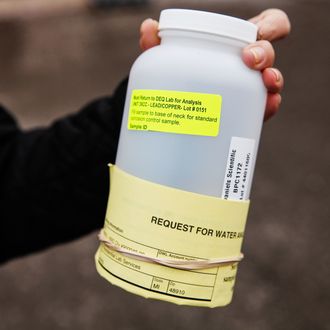
Tap water in Flint is outrageously expensive, in addition to being outrageously poisoned. A new study finds that the city’s residents paid the highest water bills in the country in 2015, even as dangerous amounts of lead flowed through their faucets.
The crisis in Flint began when the city switched its water source from Detroit’s system to the Flint River, without adding corrosion controls to prevent the more mineral rich water from eroding the city’s lead pipes. The study reveals that Flint households weren’t just forced to drink less-safe water than Detroiters — they also paid three and a half times more for the privilege.
Flint residents paid roughly $864 a year for water service, nearly double the national average. And in an economically challenged city like Flint, that price may even constitute a violation of human rights.
“It far exceeds what the United Nations designates as affordable for water and sewer service,” Mary Grant, one of the study’s authors, told the Detroit Free Press. Water service isn’t supposed to exceed 3 percent of an area’s income, according to international standards. In Flint, charges approached 7 percent.
The high cost of Flint water is a product of the city’s fiscal crisis. The municipality was put under the authority of state-appointed emergency managers, who redirected funds from the water system to fulfill other obligations. Local attorney Valdemar L. Washington told the Free Press that the city’s sewer fund had a surplus of $36 million in 2006, but ran a $23 million deficit by 2012.
Switching from Detroit’s water system to the Flint River was supposed to save the city and its residents about $1 million a year. Michigan governor Rick Snyder has pledged to spend $360 million helping the city recover from the crisis that switch created.






























